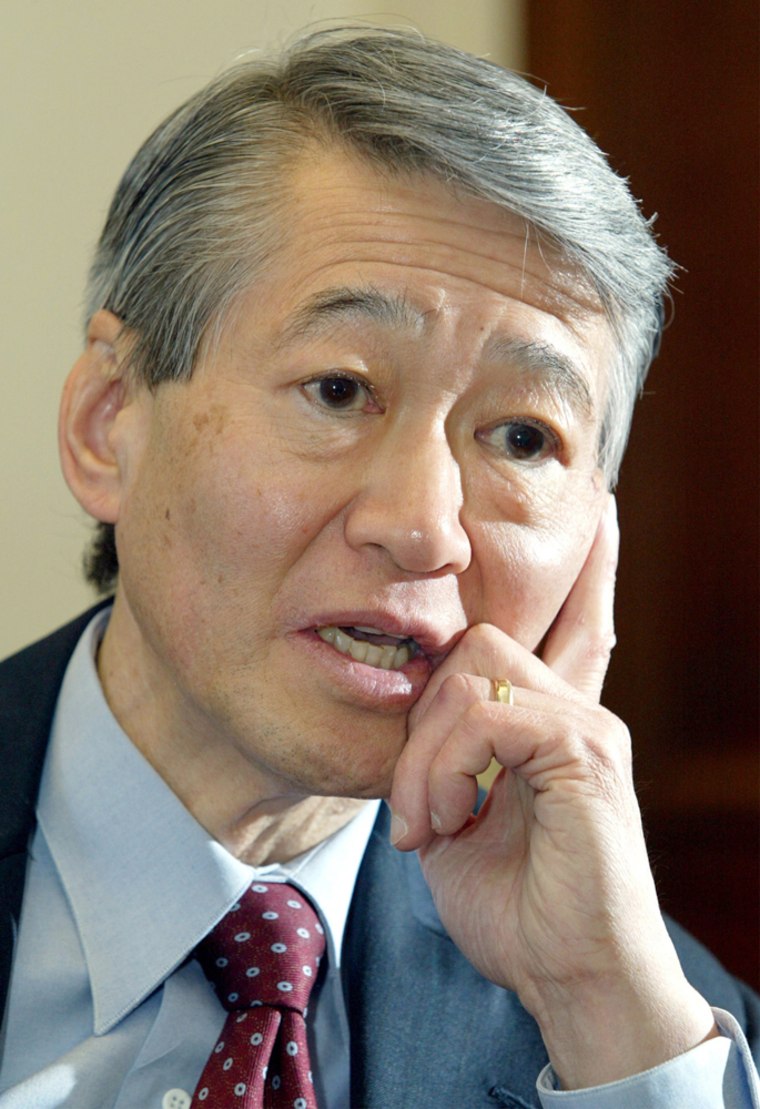The late Rep. Robert Matsui of Sacramento had good reason to distrust the federal government. During World War II, when he was an infant, he and the rest of his Japanese-American family — innocent patriots — were locked away in an internment camp in the California back country. But as a student at Berkeley in the early ’60s, he was inspired by President Kennedy's generational summons to public service. That led Matsui — rail-thin and soft-spoken, but with a tough, leathery streak — to Boalt Hall law school, the Sacramento City Council and, in 1978, to Congress as a Democrat pretty much of the old school, which is to say a Democrat in the liberal tradition of FDR, Harry Truman, JFK and LBJ: a fierce believer in the saving grace of government.
Matsui, who died Saturday at 63 of complications from a rare form of cancer, will be remembered Wednesday at a service in the U.S. Capitol's Statuary Hall.
As 2005 began, Matsui's role had been clearly marked out for him. As a member of the Democratic leadership, a trusted sideman to Minority Leader Nancy Pelosi of San Francisco and as a ranking member of the Ways and Means Committee, Matsui had been tapped to be field commander of the resistance movement in the Republican-dominated House, defending Social Security from those who would, in Matsui's view, "reform" the storied federal program into oblivion.

Matsui's death was hard to accept for the people who knew him personally. Republicans and Democrats alike were drawn to his quiet, unassuming graciousness — even while they sometimes battled him on policy. He was an uncompromising liberal on many issues, Social Security among them, and could wield the sword of partisan attack with the best of them. But he passed up several opportunities to run for other or higher office, and was a rarity in Washington: a politician who didn't emit the nervous buzz of unrequited ambition. He wanted to do well, but doing good by his lights was more important.
It's a sad habit of my trade to see political symbolism in every event. Once again, I can't help it: What's left of the Old Order is under attack, and Matsui's passing is an accidental marker of that fact. The president and his conservative GOP allies, invigorated by the 2004 elections and reaching the logical conclusion of the ideological mission they have been on for a generation, are out to dismantle the crumbling foundation of the liberals' world view.
Whether Bush will succeed or not is one of the major stories of this year.
Called insurance, but isn't
Social Security, begun in the Depression as a modest enough relief meaure to save the elderly from privation, remains one of the largest and most important edifices of what long ago came to be called (disparagingly) the Welfare State. At its core was the profound — and, some thought, profoundly un-American — idea that the federal government was the safe harbor of last resort for the old and the infirm, even if they weren't among those, such as veterans, war widows or homesteaders, who had a special claim to compensation or support. Everybody deserved at least that much security, FDR said, and every American capable of paying taxes would have to support it. It was called insurance, but never really was.
In pushing to allow younger Americans to divert tax money into "personal" savings accounts, Bush and Karl Rove are sounding modest and moving carefully. They aren't proclaiming a direct attack on the underlying concept of Social Security. But if all they were after was an actuarial fix in the program — which will, in fact, be unable to pay all promised benefits in a few decades — there are easier ones, such as raising retirement ages and raising taxes. But the president has opted for an incremental but basic shift in thinking: The government isn't the final safety net, the "market" is.
And, two Biblical generations after the Depression, Bush might just win the argument. The old folks, through the AARP, are staking out a flat-out rejectionist position — the one Matsui would have pursued had he lived. But poll numbers show that younger workers, already cynical about government and dubious about whether they will ever get Social Security benefits, are willing to consider the stock-market-based alternative, even after the post-Internet rollercoaster rides of the Dow and the Nasdaq.
The growing federal grasp
Ironically, Bush's Social Security ideas run against the flow of much of the rest of the history of his presidency, which has expanded Washington's powers. Taken together, the Leave No Child Left Behind Act, the Patriot Act and the measures creating the Department of Homeland Security represent an exponential increase in federal control of education, commerce and policing.
Bush and Rove call their vision "the ownership society," and it is a shrewd slogan. It allows the GOP to identify with the "winners" in our win-at-all-costs society, and fosters the idea that anyone who opposes the White House opposes people "owning" their own lives. But Matsui would have argued — and presumably others will do so in his place — that we already live in an ownership society, and that one of the things we own, through Social Security, is a shared sense of responsibility.